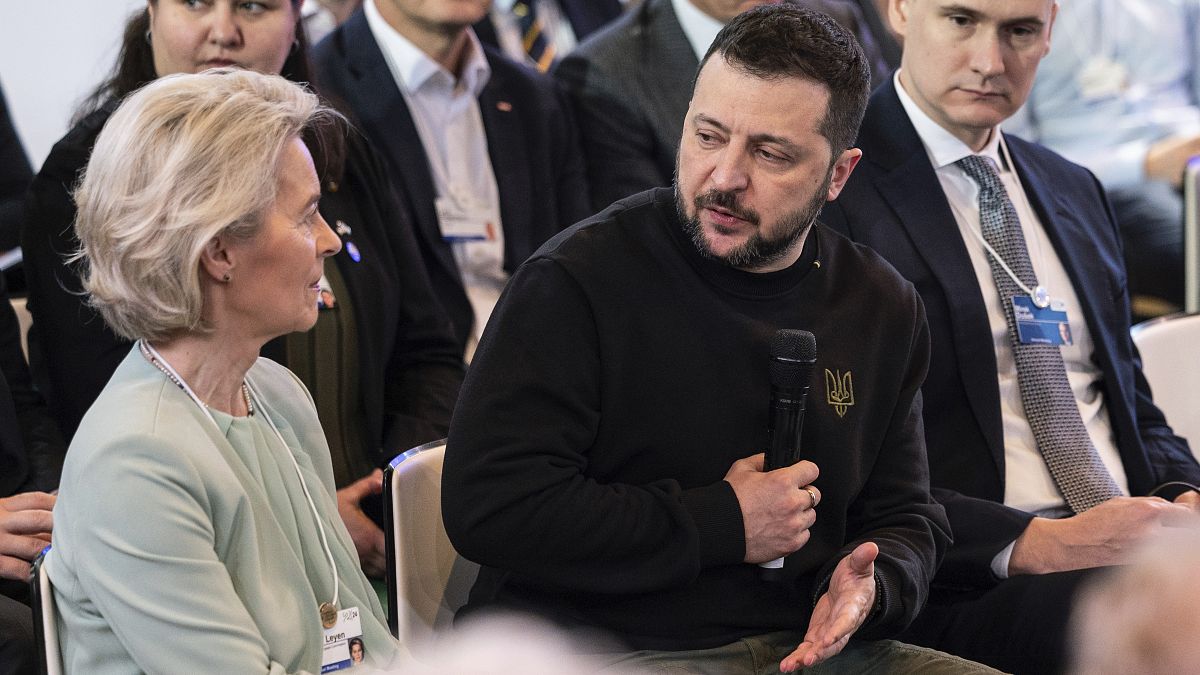In this edition of State of the Union, we focus on how elections in faraway places like Taiwan and the United States can affect Europe. We also take a look at the latest regarding support for Ukraine.
While the war in Ukraine approaches the two-year mark, there has been some sort of shadow-boxing this week over potential peace talks.
While in Davos, Ukrainian president Zelenskyy got the Swiss government to host a peace conference at some point in the future – without inviting Russia.
Then Moscow’s foreign minister Lavrov shot back saying that Ukraine would not decide when to begin any serious talks and that “the West” was not interested in negotiations anyway.
“The West” meanwhile seemed to get its act together as far as further military support is concerned.
Some EU countries committed to additional measures.
And the EU in general is now ready to approve its 50-billion-euro package soon with or without Hungary that has been blocking it for months.
“It’s very important to engage with all 27 member states of the European Union to get the 50 billion euro for four years up and running", EU Commission President Ursula von der Leyen told Euronews in Davos.
"My personal priority is to have an agreement by 27. If this is not possible, we are prepared for an agreement by 26.”
There is a renewed sense of urgency, as aid for Ukraine from its biggest donor by far, the United States, is mired in political infighting in Washington.
And then there is the prospect of Donald Trump returning to the White House next year, however speculative at this point, which could mean an end to US support for Ukraine altogether.
A nightmare for many in Europe – but a nightmare against which there is a great remedy, according to the Belgian EU presidency: just wake up!
“If 2024 brings us ‘America first’ again, it will be more than ever ‘Europe on its own’.", Belgian prime minister Alexander De Croo said in a speech before the European Parliament in Strasbourg.
"We should as Europeans not fear that prospect. We should embrace it. We should embrace it by putting Europe on a more solid footing. Stronger, more sovereign, more self-reliant.”
True, Trump won the Iowa caucuses overwhelmingly this week, but it is still a long way to go to election day in November.
The U.S. presidential election is not the only one with major ramifications for Europe this year.
A week ago, the people of Taiwan elected a new president who basically refuses to cave before Beijing who considers the island a runaway province.
The European reaction to this democratic expression was rather muted – is Europe too fearful of negative reactions from Beijing?
Questions to Mareike Ohlberg, senior fellow at the Indo-Pacific Program of the German Marshall Fund and head of the Stockholm China Forum who joined Euronews from Berlin.
Euronews: So, the election in Taiwan was one of the most closely watched geopolitical events of the year. Yet, in the run-up of the vote, the European Union barely noticed it at all – is Taiwan a too hot a potato?
Ohlberg: There is, of course, still some reluctance and commenting on it to some degree. Presumably there is still some nervousness about offending China to some degree. So there is a little bit of a dance around some of that. But overall, people here are paying much more closely attention now than just a few years ago.
Euronews: The official EU position is: yes, to bilateral ties with Taiwan, but no political recognition or diplomatic recognition. That being said, do you see an opportunity for closer cooperation now that the election is over?
Ohlberg: I think what we can do is continue some of the corporation that's already been taking place or some more close coordination we've had in the last couple of years. I mean, we've had some visits, primarily from Parliament's delegations visiting Taiwan. That is one thing that has happened. And then we've also seen some careful, more careful ties at the ministerial level, where, for instance, ministers, went to Taiwan to talk to their Taiwanese counterparts. And I think it's particularly these smaller cooperations establishing ties and making sure that Europe is invested in Taiwan, where I see the most benefit.
Euronews: EU parliamentary and government delegations made 28 visits to Taiwan last year, a new record – how do you interpret that interest?
Ohlberg: Europe can't really offer Taiwan that much in terms of security and concrete defense. I think Europe doesn't have the capacity to do that. But one thing that Europe can do, is signal an interest in Taiwan and try to signal to the Chinese government that Europe has a vested interest in stability in the Taiwan Strait, and that Europe would be firmly opposed to any attempt to change the status quo through military means or through coercion.
Euronews: Hanging over all this is, of course, fear of retaliation from Beijing. Does the EU have the stomach to pick a fight with the Chinese Communists over even symbolic agreements with Taiwan?
Ohlberg: I if you're alluding to bilateral trade agreements, I don't really think that's going to happen soon. There's been a push for that, for instance, in the European Parliament. There is some reluctance on the Commission side, on various other sides. I don't expect that to happen. But I do think there are other ways and other channels how ties with Taiwan, including trade ties, can be intensified. That may not have the same effect, but that are also helpful in this regard.
